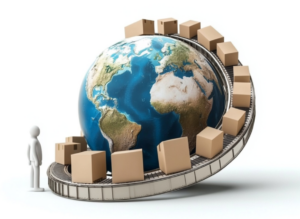A company that is fully licensed for global shipping has met all legal and regulatory requirements to transport goods internationally, ensuring compliance with customs laws, safety standards, and trade regulations. This article will explore the importance of obtaining the correct licenses, the requirements involved, and how global shipping certification impacts businesses.
Understanding Fully Licensed Shipping
Defining Full Licensing in Global Shipping
Being fully licensed for global shipping means a company has received all necessary approvals, certifications, and permissions from relevant authorities to conduct their shipping operations legally. Without proper licensing, companies may face penalties, shipment delays, or even business shutdowns due to non-compliance with international trade laws.
A fully licensed shipping company:
- Complies with international trade laws and regulations.
- Holds necessary global shipping certifications and permits.
- Ensures that operations align with customs, safety, and environmental guidelines.
- Meets financial and infrastructural requirements for global trade.
Why is Licensing Important?
Without the proper licensing, businesses risk fines, legal consequences, and reputational damage. Additionally, licensing provides credibility, ensuring that customers and business partners trust a company’s shipping capabilities. A fully licensed shipping provider guarantees that goods will be delivered efficiently, securely, and lawfully.
Global Shipping Certification: A Key Requirement
What is Global Shipping Certification?
Global shipping certification is a credential awarded to businesses that comply with standards for international trade, logistics, and transportation. These certifications often validate an organization’s adherence to trade laws, safety protocols, and shipping best practices.
Companies pursuing global shipping certification must undergo rigorous assessments that evaluate their logistics processes, documentation accuracy, and adherence to global regulations.
Examples of Common Global Shipping Certifications
There are numerous global shipping certifications that businesses may need to obtain, depending on their industry and shipping needs. These include:
- International Air Transport Association (IATA) Certification: Ensures regulatory compliance for companies involved in air cargo transport.
- Federal Maritime Commission (FMC) License: Necessary for ocean freight companies shipping into or out of the United States.
- Customs Trade Partnership Against Terrorism (C-TPAT) Certification: A U.S. Customs and Border Protection initiative that allows for expedited processing and added security in global trade.
- Authorized Economic Operator (AEO) Certification: Recognized by multiple countries as a mark of compliance with customs regulations, facilitating faster clearance.
These certifications not only enable businesses to operate legally but also enhance their credibility and reliability in international shipping.
Shipping License Requirements: What Businesses Need to Know
What Are Shipping License Requirements?
A shipping license is a mandatory credential that allows businesses to engage in the transportation of goods across borders. Each country has different regulations, but some common shipping license requirements include:
- Business Registration: The company must be legally registered and compliant with tax laws.
- Compliance with International and National Trade Laws: Includes following import/export regulations in different countries.
- Financial Stability: Proof that the company can handle financial obligations related to global shipping.
- Safety and Environmental Standards: Compliance with relevant safety protocols in logistics and environmental impact reduction.
How to Obtain a Shipping License
- Research International Shipping Regulations: Understand the licensing requirements for targeted markets.
- Apply for Relevant Certifications: Prepare documentation and meet compliance requirements.
- Verify Compliance with Local and International Laws: Ensure taxation, tariff, and customs duty standards are being met.
- Partner with Regulatory Authorities: Establish relationships with customs and trade officials for smoother licensing approval.
The Importance of International Shipping Permits
What Are International Shipping Permits?
An international shipping permit is a document that authorizes businesses or freight carriers to transport goods between countries. These permits ensure companies comply with international trade laws, customs procedures, and shipping regulations.
Types of International Shipping Permits
- Import and Export Permits – Required for businesses shipping goods into and out of countries with specific trade restrictions.
- Dangerous Goods Permits – Required for shipping hazardous materials (e.g., chemicals, batteries).
- Transit Permits – Necessary when goods must pass through several countries before reaching their final destination.
- Special Trade Permits – Required for restricted products such as pharmaceuticals, weapons, or agricultural goods.
Case Study: The Role of International Shipping Permits in Avoiding Delays
A U.S.-based manufacturer exports electronic devices to Europe. Without the proper international shipping permits, the shipment is delayed at customs for lacking hazardous material clearance for lithium batteries. As a result, customers face extended wait times, and the company incurs additional fees to rectify the documentation.
By ensuring the correct permits are obtained beforehand, businesses avoid delays, extra costs, and dissatisfied customers.
Compliance in Global Shipping: Why It Matters
Compliance in global shipping is about adhering to international trade regulations, customs procedures, and safety protocols. Non-compliance can lead to:
- Fines and Penalties: Shipping without proper licenses may result in hefty fines.
- Delays and Extra Costs: Non-compliant shipments can get held up at customs.
- Business Restrictions: A company that continuously violates trade laws may lose its shipping privileges.
Case Study: The Cost of Non-Compliance
A European e-commerce company attempted to expand into the U.S. market. However, it failed to comply with U.S. customs regulations, leading to several shipments being detained at customs. Customers received their products weeks later than promised, leading to negative reviews and decreased trust in the brand. The company was eventually forced to halt operations and reassess its licensing and compliance strategies.
Emerging Trends in Global Shipping
How Technology is Revolutionizing Compliance and Licensing
- Automated Licensing Systems: Digital platforms streamline the permit and licensing application process.
- AI-Powered Compliance Checks: Artificial intelligence helps companies track regulation changes and ensure compliance.
- Blockchain in Logistics: Improves transparency in global trade by securely tracking all shipments and required documentation.
Final Thoughts
Being fully licensed for global shipping is not only a legal requirement but also a critical factor for maintaining operational efficiency, credibility, and customer trust. Companies that meet shipping license requirements, obtain global shipping certifications, and comply with international shipping permits navigate the complexities of trade with fewer obstacles and greater success.




